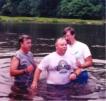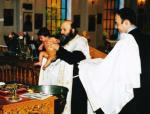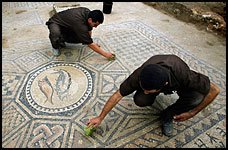

Following up on our Bible class discussion last Sunday, here's a story and a conversaton you might like to read: It's the "Introduction" of Uuras Saarnivaara's
Scriptural Baptism: A Dialogue between John Bapstead and Martin Childfont (New York: Vantage Press, 1953).
Martin Childfont and John Bapstead were neighbors in the city of Zion. The former was a member of a church that practice infant baptism. The latter belonged to a church that taught that baptism is the immersion or dipping of a person in water, on confession of faith in Christ, administered in the name of the Father, Son, and Spirit. [
1]
Martin and John had originally been members of the same church, and both of them had been baptized as infants. But John had become converted to the faith of those who opposed infant baptism, whereas Martin had come to a personal faith and knowledge of Christ as his Savior in his own church. For a while he too had struggled with doubt about infant baptism; but his study of the Scriptures and literature on baptism had led him to the conviction that the baptism that he had received in his infancy was a Biblical baptism, and that he did not need to be baptized anew.
John and Martin had occasionally exchanged opinions on baptism. But one night they decided to discuss the subject more thoroughly. Although the conversation lasted several hours they were unable to reach a conclusion and agreed to continue it the next day. John starts the actual discussion.
John Bapstead: You remember, Martin, the time when we both were members of your church. You also remember how I left it and joined the congregation of which I am now a member. The reason was that the Lord led me to a new understanding of His will concerning baptism. I wanted to obey His word and to have a Scriptural baptism. It was not easy to sever the ties that bound me to the church of my childhood and youth, and to join another church. But I had to do it in order to be obedient to the Lord, and He always blesses those who do. Since that time I have hoped and prayed that God would also reveal to you His will concerning baptism. As you know, we reject infant baptism because it is without warrant, either express or implied, in the Scripture. First, there is no express command that infants should be baptized. Second, there is no clear example of the baptism of infants. Third, the passages held to imply infant baptism contain, when fairly interpreted, no reference to such a practice. [
2]
Martin Childfont: It's nice that you have such an affectionate concern for me. Before we start our discussion on baptism we should agree on the principles of the interpretation of the Scriptures. You stated that there are passages in Scripture which are held to imply infant baptism, but that those passages contain no reference to such practice when fairly interpreted. We should have a common understanding of the "fair interpretation" of God's word. Will you accept as a basic principle of fair interpretation the old statement: If the plain and obvious literal sense make good sense, seek no other sense?
John: I will. I believe that all sound interpretation of Scripture should follow that principle.
Martin: Will you also accept the principle that the Bible must be used as its own interpreter, so that passages which are not clear in themselves must be interpreted with the help of other Scriptural passages which speak of the same thing?
John: I think that that principle is also sound as a fair interpretation of the Bible.
Martin: Fine. We are getting off to a good start in our conversation. When we study the Scriptures, it may happen that there appears to be a discrepancy between its statements and the teachings of the church, or the denomination to which we belong. There are people who in practice, though perhaps not in express statements, think: "Scripture is right since it is God's word, and we are right because our doctrine is true. If, therefore, a Scriptural statement seems to be in conflict with our doctrine, it must be interpreted in harmony with the latter." Do you in any way agree with that principle?
John: No, certainly not. And who are those who follow such an impossible principle?
Martin: The majority of churches and denominations seem to be. A large amount of theological work is done according to the principle although it may not be expressed, or even admitted. But I think that we should be on our guard primarily in our own case, lest we follow that deceptive principle. Let us take care that we remove the beam first from our own eye, and then see how we can take the mote from our brother's. We all have a strong tendency to follow that erroneous principle without being aware of it -- but we have a rather sharp eye that sees when our brother follows it.
John: I admit that you're right with regard to that danger. The Bible should be the supreme and only source and norm of our faith and life, not only in principle but also in practice.
Martin: We agree, then, on this point. Scripture should be understood and interpreted according to its obvious literal sense, whenever it makes good sense, and it should be used as its own interpreter. Our confession of faith and doctrine must be corrected according to the word of God and not the Bible according to the doctrine of our church. There is, however, one more question that requires an answer, namely, the question of the use of reason in the interpretation of the Scriptures. Your remark about a "fair interpretation" seems to imply this problem. I think we agree on the principle that human reason and its conclusions should never be placed above the statements of Scripture. If there appears to be conflict between the Bible and our reason, or the apparent results of human science, psychology, and such, in questions pertaining to the Christian faith, which should follow the Bible, not human reason, psychology or science. Do you agree with me on that point?
John: I do. If we were to follow our reason, human science, psychology, and such, we would be rationalists and not Christians.
Martin: Well, it's fine that we find ourselves in concord on this question. I think that human reason has its legitimate and necessary place in the interpretation of Scripture and theology, for it is the means by which we humans perceive and think. When God speaks to us in His word He uses human language, and thus He follows logic and grammar, for otherwise we could not understand what He means. The Holy Spirit is logical and grammatical in speaking to us through the men who have written in the Scriptures. The Bible and Christian faith are logical and in that sense reasonable. All fair interpretation of Scripture should therefore be grammatical and logical. Anyone who errs in grammar cannot but err also in this doctrine. All interpretation of the Bible which is in conflict with the simple rules of grammar and logic must be wrong. Do you accept this principle?
John: Of course, I do. How could we ever know what the Scriptural text means if we did not take it in its simple grammatical sense, when that sense makes good sense?
Martin: Would you accept as good sense a grammatical sense that runs against natural human reason and psychology?
John: I would, for the natural reason of man cannot understand the things of God. Our reason must be enlightened by the Holy Spirit in order to understand the truth and will of God.
Martin: Would you substitute in any question a so-called enlightened reason, sometimes known as Christian consciousness, Christian experience, or Christian conviction for the word of God in its simple grammatical sense?
John: No, I would not. Being Bible-believing Christians we should follow the word of God. Our reason, Christian consciousness, experience, and conviction must be brought into harmony with the Scriptures, and not vice versa.
Martin: One more question. There are many things on which the Bible says nothing but which still belong to Christianity, or at least are necessary things in the life of the Church. For instance, the New Testament never speaks of women having participated in holy communion; neither does it speak of Sunday schools, church edifices, of the use of automobiles for going to church. Do you think that the Church has a right to have these things, and also to regard them as being in harmony with the will of God, although they are not mentioned in the Bible?
John: Of course, I do. In whatever thing the Bible gives no commandment or instruction, we are free, if only it is in harmony with the spirit of the word of God.
Martin: Do you think that a thing is in harmony with the spirit of God's word if it can be logically deduced from its plain statements, although it is not expressly stated?
John: I do. For instance, although women are never mentioned as having participated in holy communion we made deduce it from the fact that it is never forbidden, and that, according to the teachings of the New Testament, there is neither man nor woman, but all are one in Christ.
Martin: Fine. let us remember these principles in our discussion on baptism.
John: One more remark. Some pedobaptists admit that there is neither clear precept nor example in the New Testament to commend the practice infant baptism. They hold, nevertheless, that the general spirit of the Gospel favors it. Fundamental truths are taught there and from them the practice may be inferred. [
3] I think that by basing our doctrine and practice on what we regard as the general spirit or scope of Scripture, we're able to prove anything and regard any doctrine as Scriptural. I believe that every doctrine must be based on the plain and clear statements of Scripture. We know the "spirit" of Scripture only from its plain statements.
Martin: I am in complete agreement with you on that point, too. All the falsifiers of Christianity have used that trick: the men who have originated or develop it have replaced the plain teachings of the word of God in its simple grammatical sense with what they have thought to be its "Spirit" or "general scope."
Since we agree on the principles of the interpretation of Scripture, and on the Bible as the source and norm of the Christian truth, but us turn to the discussion of the problem of infant baptism.
Notes
[
1] Edward T. Hiscox, The New Directory for Baptist Churches (Philadelphia: American Baptist Publication Society, 1894), p. 123.
[
2] Augustus Hopkins Strong, Systematic Theology (5th ed., revised and enlarged; New York: A.C. Armstrong and Son, 1896), p. 535.
[
3] Hiscox, op. cit., p. 486.
 Ash Wednesday falls on 01 March this year, and perhaps it not too early to be thinking about a good book to read during Lent. If you would like to make some recommendations, please add a comment to this posting and tell us about your book suggetions. Maybe we can all agree to read something together and share our thoughts?
Ash Wednesday falls on 01 March this year, and perhaps it not too early to be thinking about a good book to read during Lent. If you would like to make some recommendations, please add a comment to this posting and tell us about your book suggetions. Maybe we can all agree to read something together and share our thoughts?










